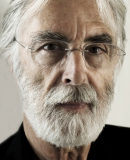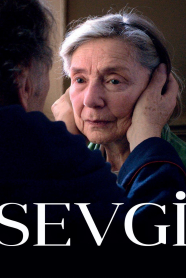
Michael Haneke
Michael Haneke
Film director, screenwriter, actor
Michael Haneke (born 23 March 1942) is an Austrian film director and screenwriter best known for films such as Funny Games (1997), Caché (2005), The White Ribbon (2009) and Amour (2012). His work often examines social issues, and depicts the feelings of estrangement experienced by individuals in modern society. Haneke has worked in television‚ theatre and cinema. Besides working as a filmmaker, Haneke also teaches film direction at the Film Academy Vienna. At the 2009 Cannes Film Festival, his film The White Ribbon won the Palme d'Or, and at the 67th Golden Globe Awards the film won the Golden Globe Award for Best Foreign Language Film. In 2012, his film Amour premiered and competed at the 2012 Cannes Film Festival. The film would go on to win the Palme d'Or, making it his second win of the prestigious award in three years; this made him the seventh director (at the time) to have won it twice and the only Austrian director to have accomplished this. The film received five Academy Award nominations, including Best Picture, Best Director, Best Original Screenplay, and Best Actress in a Leading Role for Emmanuelle Riva. It won in the category of Best Foreign Language Film. Haneke has made films in French, German and in English. In 2013 Haneke won the Prince of Asturias Award for the arts. Haneke's feature film debut was 1989's The Seventh Continent, which served to trace out the violent and bold style that would bloom in later years. Three years later, the controversial Benny's Video put Haneke's name on the map. Haneke achieved great success in 2001 with the critically successful French film The Piano Teacher. It won the prestigious Grand Prize at the 2001 Cannes Film Festival and also won its stars, Benoît Magimel and Isabelle Huppert, the Best Actor and Actress awards. He has worked with Juliette Binoche (Code Unknown in 2000 and Caché in 2005), after she expressed interest in working with him. Haneke frequently worked with real-life couple Ulrich Mühe and Susanne Lothar – thrice each. His film, The White Ribbon, premiered at the 2009 Cannes Film Festival and won the Palme d'Or. The film is set in 1913 and deals with strange incidents in a small town in Northern Germany, depicting an authoritarian, fascist-like atmosphere, where children are subjected to rigid rules and suffer harsh punishments, and where strange deaths occur. In 2012, his film Amour also won the Palme d'Or. Haneke says that films should offer viewers more space for imagination and self-reflection. Films that have too much detail and moral clarity, Haneke says, are used for mindless consumption by their viewers. His 2012 film Amour won the Best Foreign Language Oscar and was nominated for the Best Picture Oscar at the 85th Academy Awards. In 2013 he was the subject of the documentary film Michael H – Profession: Director. Haneke has directed a number of stage productions in German, which include works by Strindberg, Goethe, and Heinrich von Kleist in Berlin, Munich and Vienna. In 2006 he gave his debut as an opera director, staging Mozart's Don Giovanni for the Opéra National de Paris at Palais Garnier when the theater's general manager was Gerard Mortier. In 2012, he was to direct Così fan tutte for the New York City Opera. This production had originally been commissioned by Jürgen Flimm for the Salzburg Festival 2009, but Haneke had to resign due to an illness preventing him from preparing the work. Haneke realized this production at Madrid's Teatro Real in 2013.
For more information press link below:
